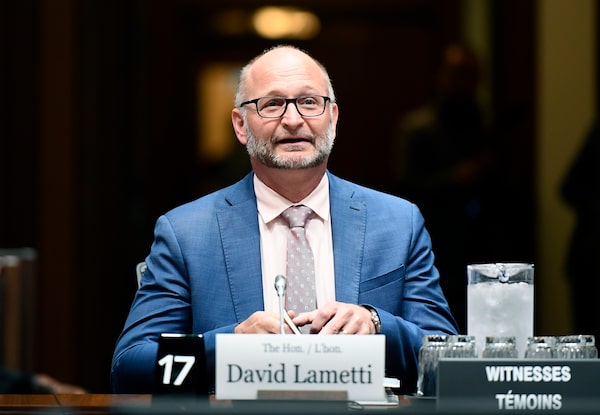
Attorney-General David Lametti, seen here on July 25, 2019, signed a secrecy certificate to prevent details about a Canadian Security Intelligence Service surveillance operation on the Chinese embassy in Ottawa from being disclosed in the case of a man accused of trying to leak secrets to China.Justin Tang/The Canadian Press
For the first time in Canada, the federal attorney-general has overridden a judge’s order to release documents that the government considers to be national-security secrets.
Attorney-General David Lametti signed a secrecy certificate to prevent details about a Canadian Security Intelligence Service surveillance operation on the Chinese embassy in Ottawa from being disclosed in the case of a man accused of trying to leak secrets to China.
“This certificate, issued personally by me, prohibits the disclosure of some of the information disclosed by a designated judge,” reads the certificate, which was signed Nov. 14 and filed in the Federal Court of Appeal.
It says the information in question will be sealed for a decade. And, because the certificate can be renewed, it could be sealed permanently.
The federal attorney-general was given this power in the 2001 Anti-Terrorism Act, but it has never before been used.
"Following extensive review and careful consideration of all the facts, I determined other options had been exhausted and that there was a need to issue a certificate,” Mr. Lametti said in a statement to The Globe and Mail. He added that “this is a necessary step.”
The Justice Department confirmed this is the first time the power has been used in Canada, though “similar authorities exist” in closely allied countries, including the United States, it said.
The secrecy-certificate power was “severely criticized when it was introduced,” said Kent Roach, a University of Toronto law professor. “It was seen at the time as a kind of atom bomb when it comes to this kind of dialogue about secrecy.”
The certificate was issued in the continuing criminal case of Qing Quentin Huang.
Mr. Huang, a one-time employee of a military contractor in Burlington, Ont., was arrested after allegedly calling the Chinese embassy to try to pass along Canadian naval secrets. He was charged in 2013 with violating the Security of Information Act.
CSIS had been bugging the embassy as part of an unrelated intelligence investigation. The agency recorded his conversations and passed the tapes to RCMP investigators.
Over the past six years, the case has been stuck in pretrial proceedings. It has bounced among four levels of courts, as the government has tried to rebut Mr. Huang’s arguments that he needs to see CSIS documents so that he can mount a full defence.
Like police, intelligence officers have to swear wiretap-warrant applications in closed hearings before judges grant them access to surveillance powers. But unlike police, CSIS’s bids are designed to never see the light of day – details of these operations are typically forever hidden away in classified documents and closed courtrooms.
On Aug. 30, Federal Court Justice Richard Mosley ruled that portions of the CSIS warrant and some supporting documents could be safety turned over to Mr. Huang and his lawyer.
The government immediately appealed, as it has several times before, saying national security was at stake. But this time, before any further arguments could be heard, Mr. Lametti decided to play the government’s ultimate trump card.
The certificate specifically blocks the release of six paragraphs of the 166-paragraph wiretap affidavit CSIS used to target the Chinese embassy. “Recognizing the right of Mr. Huang to a fair trial … I have agreed to disclose most of the information at issue to Mr. Huang, but for the purpose of safeguarding national security, some of that information should be prohibited from disclosure,” the certificate reads.
Some observers say the entire prosecution could now be at risk if the trial judge decides the accused has been denied evidence due to him.
“The idea that it’s only six paragraphs may help,” said Leah West, a former Justice Department lawyer. But, she added, “It may be hard for the trial judge – not having seen the information – to conclude that Mr. Huang’s fair-trial rights can be adequately protected without the disclosure of the withheld information.”
Frank Addario, the lawyer who is acting for Mr. Huang, says it is too soon to talk about next steps. But he said that “it’s the executive overriding the decision of the judicial branch, which is an unusual power for Parliament to give the executive in Canada."
A Federal Court judge “said the evidence we sought was relevant to the litigation in the trial court – and that evidence is now not going to be available to us,” Mr. Addario added.
Secrecy certificates can be appealed to a Federal Court of Appeal judge but the parameters are extremely narrow. The act states that they can only be reversed if the judge is persuaded that the underlying matters are unrelated to national security.
 Colin Freeze
Colin Freeze